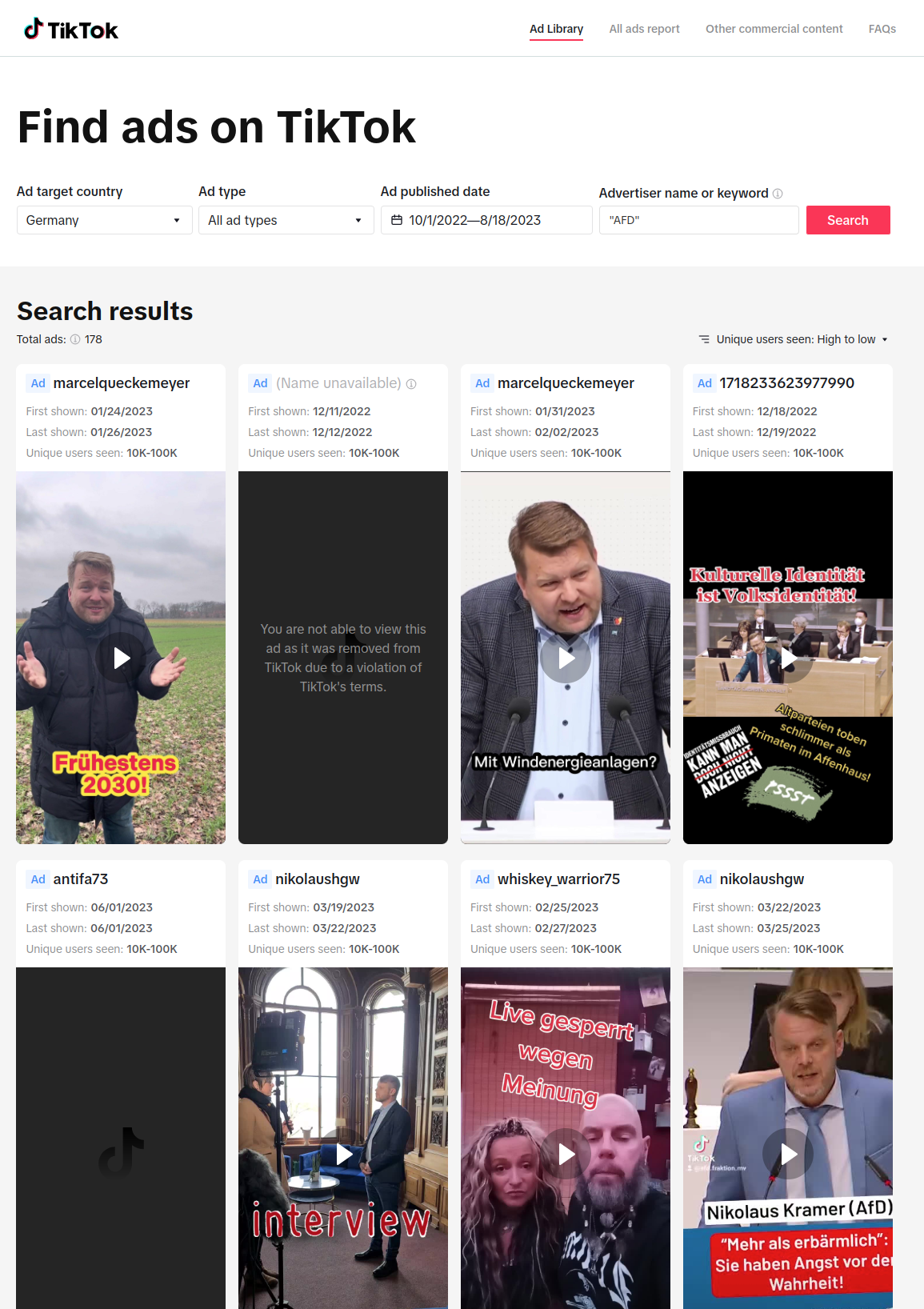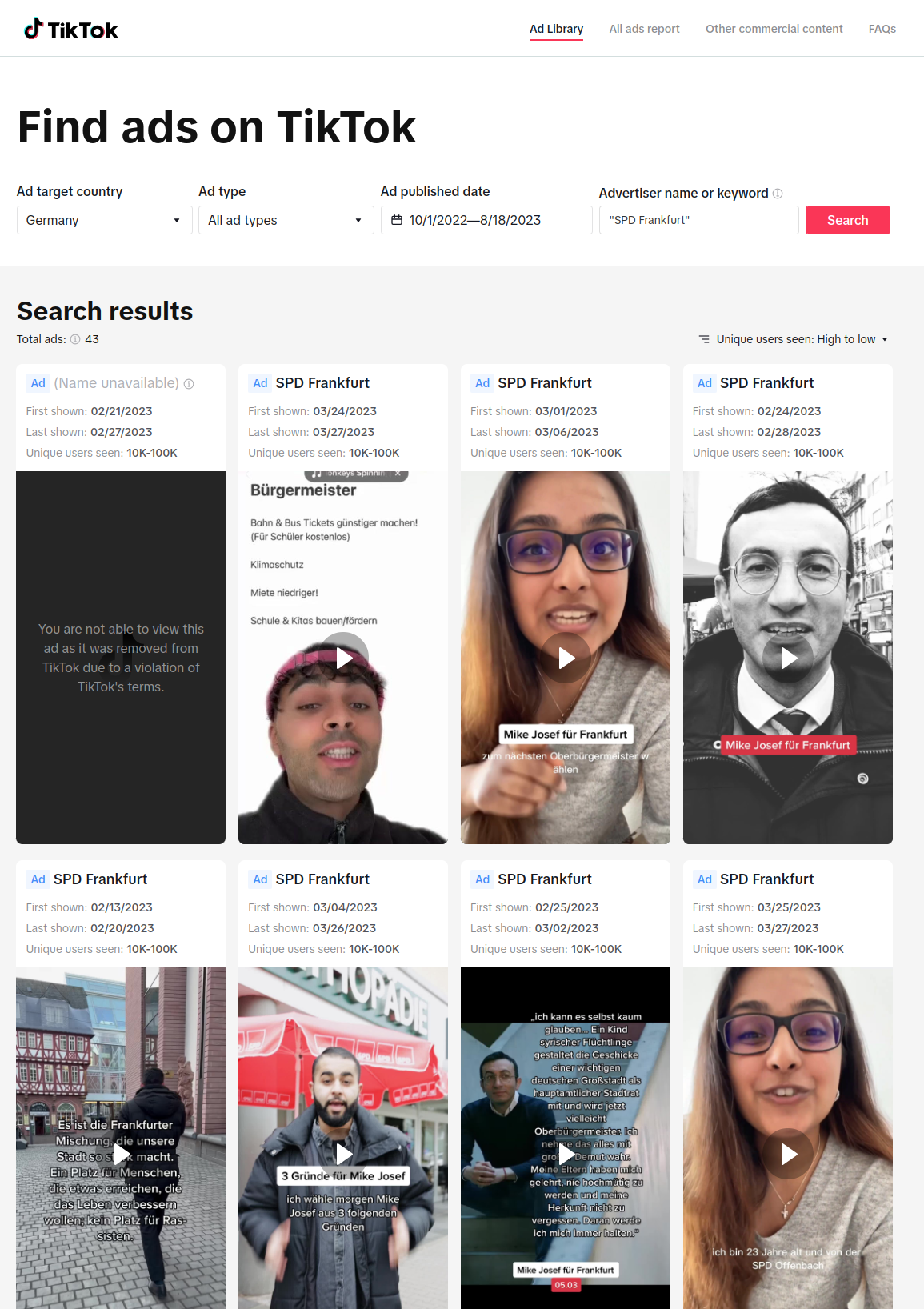🤿 Diving into TikTok's Ad Library: Surfacing with Missing Data and Unenforced Guidelines
In April 2020 TikTok announced their new “Guidelines for advertisements on TikTok”, which explicitly forbid political advertisements on the platform. TikTok claimed that they “will not allow paid ads that explicitly promote or oppose political candidates, officeholders, political parties, or groups or issues at the federal, state, or local levels”. An investigation by Mozilla in 2021 already had shown that the political ad policies can easily be circumvented with influencer marketing. Therefore, TikTok updated these guidelines and introduced a “comprehensive monetization block for political accounts”.
Until recently it wasn’t possible to systematically prove whether and how strongly TikTok enforced all these guidelines. With the Digital Services Act (DSA) putting more pressure on transparency efforts of “Very Large Online Platforms” (VLOPs), TikTok introduced their “Commercial Content Library” in July 2023.
In the corresponding FAQ they point out, that “TikTok does not show political or election ads on the platform. So you will not be able to find ads of political nature in the Commercial Content Library”. But surprisingly, it is not complicated at all to find such ads. Even though the library lacks important information, the way how easy it is to find political advertising raises questions on how seriously TikTok enforces these guidelines. A simple search for the abbreviations of German political parties already shows numerous examples of ads placed by politicians or parties as well as a seemingly endless number of political ads by other people. Especially politicians of the “AfD” seem to use ads on TikTok systematically to reach out to potential voters. We found examples of accounts from members of the German parliament (MdBs) and members from the federal parliaments (MdLs). Besides that, we found even more political ads promoting the AfD, that are not associated with an official account of a member of the party. Even though other parties don’t seem to use TikTok ads to a similar extent, we also found examples of accounts of city and local chapters of political parties advertising political content.


Screenshots from the search results for different political parties
There are many indications that the German context is no coincidence and the political ad policies are not strongly enforced in other contexts as well. Journalists of the Forbes magazine revealed even that “TikTok has pushed Chinese propaganda ads to millions across Europe”.
The TikTok ad library can be seen as a starting point, enforcing transparency and data access obligations under the DSA. For a more systematic analysis the library lacks important information. TikTok also deleted some ads due to violations of their terms of service (“You can’t view this ad because it was removed from the platform due to a violation of TikTok’s terms.”). While it is possible to get the information that a specific ad was removed, neither the ad itself nor any information about the advertiser is shown on the library, making it impossible to draw any conclusions from it.
Auditing the specific flaws or bias of TikTok´s advertising system would require that information and also more detailed search options than just the search for advertiser name and keyword. The descriptions of ads are also not disclosed in TikTok’s ad library, making it very difficult to find the exact product or service the ad is referring to.
Nevertheless, it was very easy to find anecdotal evidence from TikTok´s ad library, to show that there is a lack of enforcement on the political advertising guidelines. A systematic analysis is currently not possible due to lack of information provided by the library. We hope, that TikTok adjusts the functionality and provides more information, so that researchers can use the ad library to conduct systematic research.
Enjoy Reading This Article?
Here are some more articles you might like to read next: